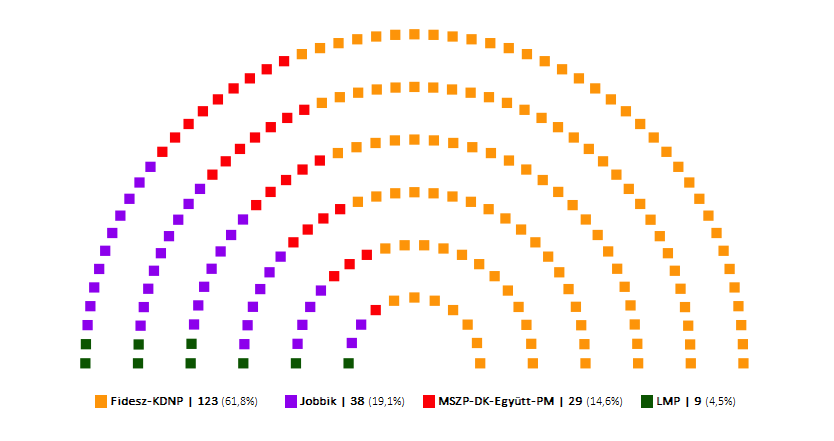According to the mandate estimation by Nézőpont Intézet – based on the latest opinion poll results – Fidesz-KDNP representatives would gain nearly two-thirds of the mandates. Fidesz-KDNP would secure strong and stable majority in Parliament despite the fact that its support among the total population has decreased since last Fall.
Nézőpont Intézet set up a model – based on the latest potential party preferences – as to how many mandates various parties could count on if parliamentary elections were held this Sunday. In our latest representative public opinion poll that was conducted by asking 1,000 people between January 24-26, 2015, Fidesz-KDNP had 40 percent potential support, MSZP had 12 percent, DK had 6, Együtt had 4, LMP had 8, while Jobbik had 27-percent.
To construct an estimate of mandates based on these results, Fidesz-KDNP would obtain 123 mandates (nearly two-thirds of all parliamentary mandates), which would continue to secure a stable majority for the government alliance. Fidesz-KDNP would secure a strong and stable majority in Parliament despite the fact that its support among the total population has decreased since last Fall. Based on our estimation, Jobbik would obtain 39 seats, the MSZP, DK, and Együtt alliance would secure 29 seats combined, while LMP would receive 9 mandates.
Methodology
Mandate estimation of Nézőpont Intézet meriting from previous election results provides an estimation using potential party preferences as a departure point in attempting to gauge the number of likely mandates that each party would secure if parliamentary elections were held this Sunday. When engineering this model, the results of the 2010 and 2014 parliamentary elections are considered at the level of individual districts (the results of the 2014 elections counting more, with a 70-percent weighing factor). The essence of the model (as well as its streamlined nature) lies in a method that the deviation of individual district results from party list election scores is considered to be a constant. When calculating the size of the deviation, we have applied a mixed method, which uses both additive and multiplicative elements. Based on current nationwide potential party preference scores, we provide an estimate as to what results may accrue in each election district, with the help of which individual mandates can be allocated between the parties. Nationwide mandates tied to lists (including fragmentary votes) are calculated based on rules determined by the election law. We are considering a combined campaign by left-wing parties (MSZP, DK, Együtt, PM) in our model. When considering mandates that are tied to party lists, we are including votes from abroad, using the 2014 elections as a constant factor (which means one additional mandate for the Fidesz-KDNP list).
Download here.
